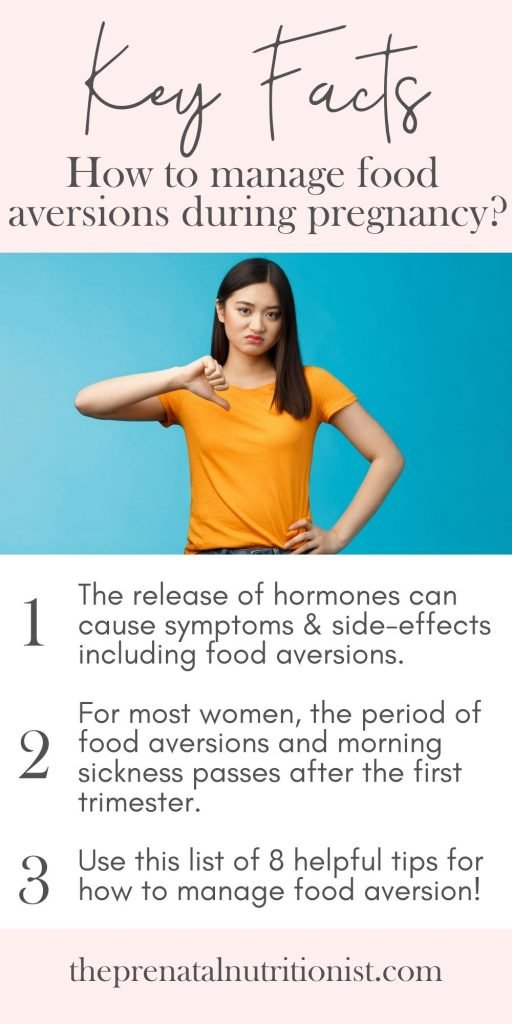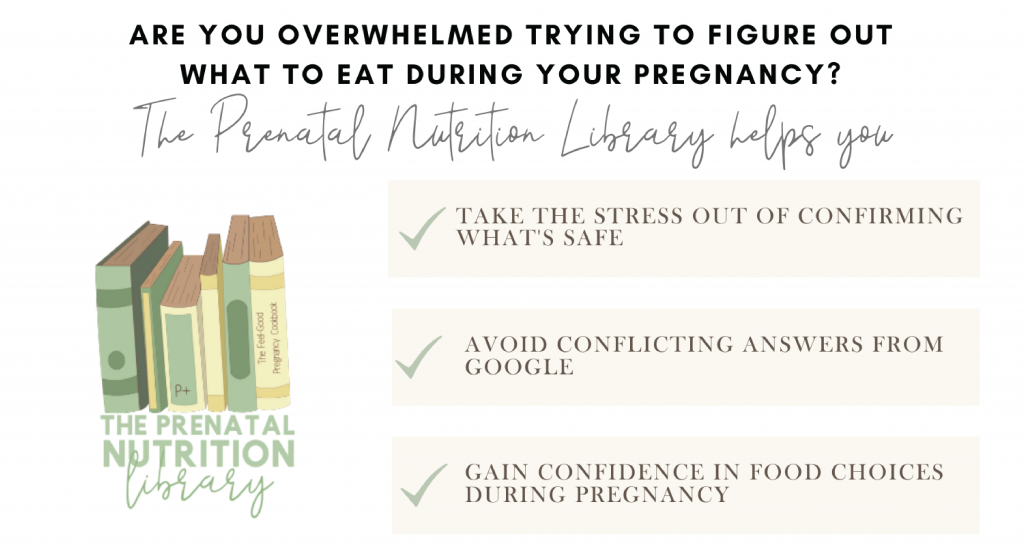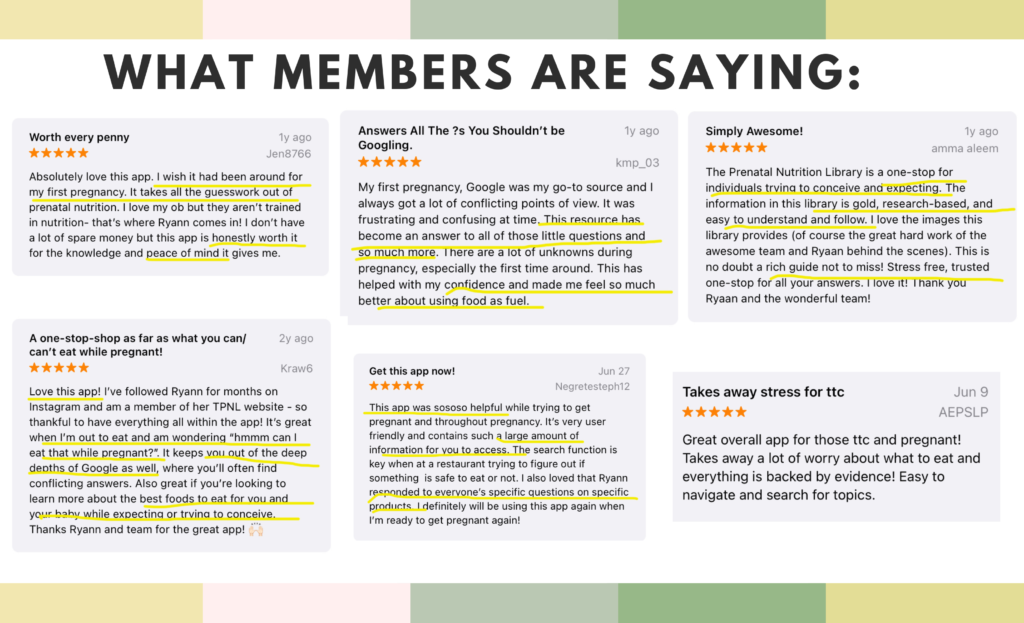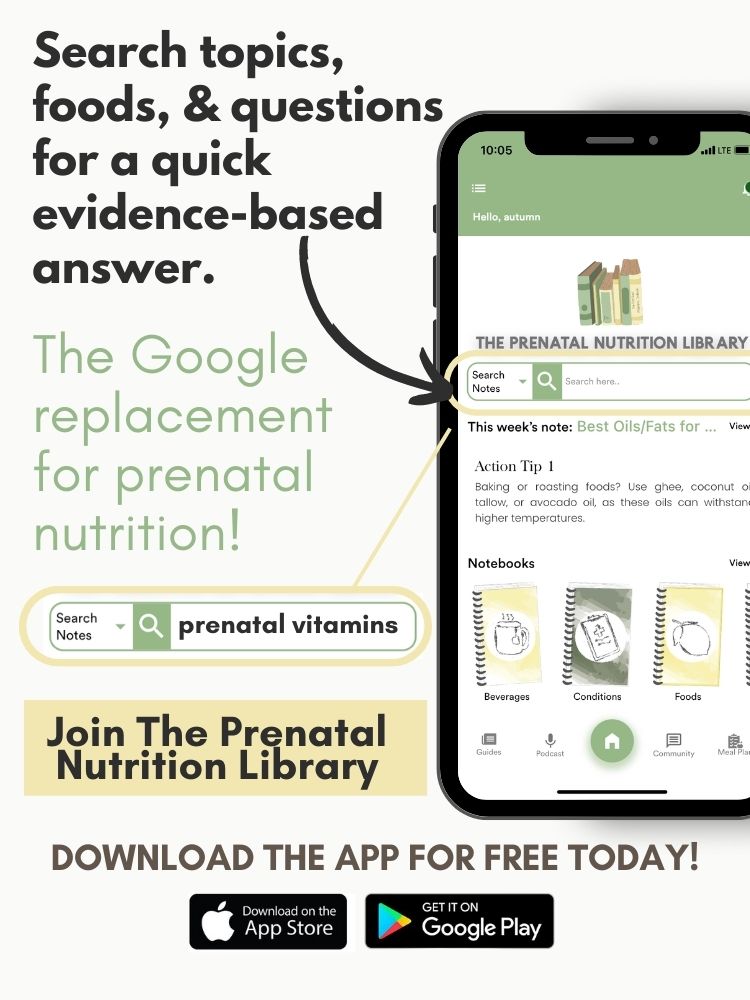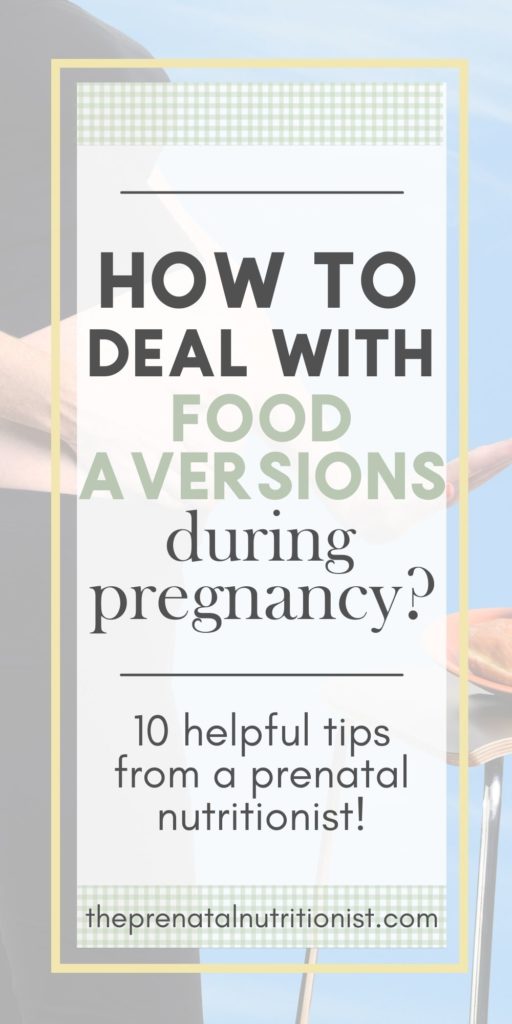
We don’t know exactly why all morning sickness, food cravings, and food aversions occur during pregnancy. It could have something to do with the hormone changes like the increase in human chorionic gonadotropin or hcg. It’s also theorized food aversions were, at one point in time, our body’s way of protecting us from harmful foods. Although interesting, in modern society it’s much less likely the foods we eat would cause harm. Food cravings and aversions are thought to be part of the pregnant women’s experience so today we are diving into common food aversions during pregnancy and some helpful tips.
Nonetheless, research shows that almost 70% of women experience food aversions for at least one month during pregnancy. Food aversions, whether triggered by taste or smell, are a super common symptom of pregnancy. Food aversions often go hand-in-hand with “morning sickness”, nausea, and vomiting.
For most pregnant people, the period of food aversions and morning sickness passes after the first trimester or early second trimester. For others, aversions can last throughout pregnancy. Chronic morning sickness, increased sense of smell, and food aversions can make it harder to meet the nutritional requirements needed for a healthy pregnancy. Plus, there’s nothing worse than having a food aversion to your favorite food.
In light of this, we’re sharing some tried and tested tips for how to cope with food aversions and to help make sure you maintain a healthy, feel-good pregnancy throughout your whole journey!
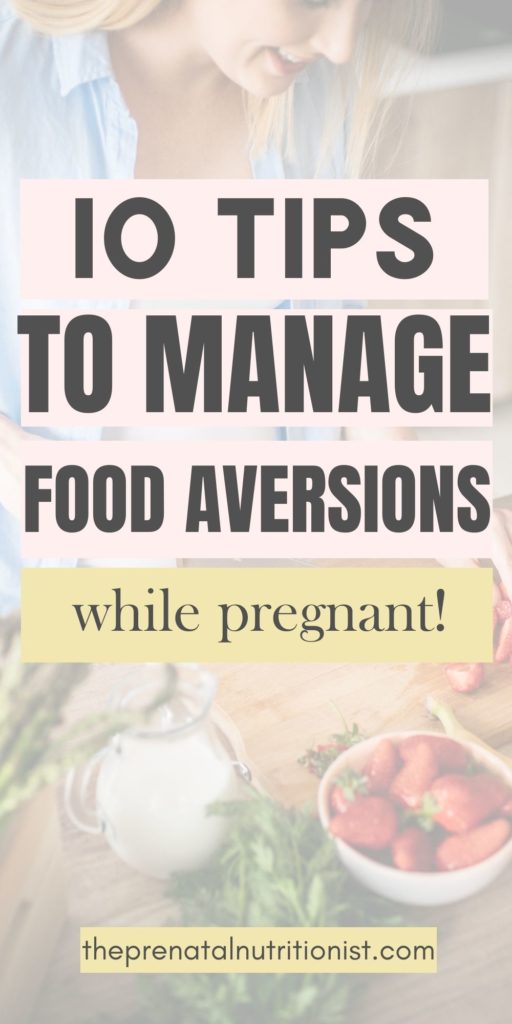
How To Deal With Food Aversions During Pregnancy
Always have plenty of options.
In case of sudden onset of food aversion to a specific food or nausea, always have plenty of food options available. Some pregnant people find having a snack ready on their bedside table for the morning before getting out of bed, like crackers, cereal, or a banana, helps to combat morning sickness symptoms. For meal inspiration and ideas to have on hand, be sure to check out these healthy breakfast ideas for pregnant women and these healthy pregnancy lunch ideas for work. And if you’re only craving sweets, try one of these healthy sweets for pregnancy!
Stay hydrated.
Hydration is very important and, unfortunately, an aversion to water isn’t uncommon. The good news is that are a number of different beverages you can also try to stay hydrated. Like these drinks for early pregnancy. Many of the drinks on this list do wonders for reducing nausea and fighting upset stomach and constipation. Plus, many also pack in essential vitamins and minerals that help to support a healthy pregnancy. Popsicles, soups, and high water fruits and vegetables can also help to meet fluid needs.
Eat often.
Eating small frequent smalls can help to combat nausea. If you go too long without food, this can trigger hunger pangs and nausea that can make it even harder to eat when you’re hungry. Try to eat several small meals and snacks throughout the day, even if it’s just a few bites at a time! Give these healthy snack ideas for pregnancy a try for satisfying and nutrient-dense ideas.
Opt for mild-tasting foods.
Unfortunately, there are some common foods that can upset the stomach during pregnancy and you can likely guess some of them. This list includes spicy foods, fried foods, acidic foods, caffeine, and more. More plain or mild-tasting foods may be better tolerated when food aversions and nausea strikes. Baked potatoes, noodles, rice, yogurt, beans, and nut butter are among some of the commonly well-tolerated foods when dealing with aversions. Other foods that are excellent during periods of food aversion are avocado and sweet potato. Both are mild tasting, easy to digest, and full of nutrition!
Sneak in vegetables when possible.
If you are dealing with an aversion to vegetables, there are ways to sneak them in to get the benefits of vegetables during pregnancy. Try new cooking methods using real butter and salt or sneak them into casseroles and soups. Smoothies are a smart way to add veggies to your diet as well. Smoothies that combine bananas, berries, a handful of spinach or kale, nuts/seeds, and milk or other liquid might be most tolerable during this time.
Eat cold foods.
Because warm foods are more aromatic, they are more likely to contribute to smell-induced food aversions. During spells of food aversions and nausea, try opting for a cold meal instead. Cold foods and meals could include fruit, smoothies, homemade pasta salad, or a yogurt bowl. Try one of these green smoothies as your next cold meal or snack!
Add in high-calorie foods.
Incorporate higher-calorie foods like extra-virgin olive oil, peanut butter or other nut butter, whole milk, full-fat dairy products or creams into your meals. If you aren’t getting many calories due to aversions or sickness, this is a great way to boost your caloric intake.
Let someone else do the cooking.
Cooking can create strong aromas and smells. These aromas can often trigger food aversions and make it hard to eat the meal and healthy foods that you’ve just worked so hard on. When experiencing food aversions or nausea, let someone else do the cooking if you can. This may mean choosing healthy take-out options or allowing your significant other, family member, or friend to whip you up a delicious meal. If the chef isn’t sure what to cook, have them try one of these Mediterranean diet recipes for fertility. These recipes contain a multitude of essential vitamins and minerals required for a well-balanced diet during pregnancy.
Give yourself grace.
When dealing with strong food aversions, remember to go easy on yourself and always give yourself grace. If what you can tolerate is mac and cheese, eat the mac and cheese and do not feel guilty! Take advantage of incorporating more well-balanced, nutrient-dense meals whenever you can. But remember, some calories are truly better than no calories. Also remember, for most this is only temporary and will pass. There will be opportunities to incorporate nutritious food choices throughout pregnancy.
Don’t be afraid to ask for help!
Taking care of yourself and your baby is a top priority. Never be afraid to ask questions, seek out clarification, ask for help, or talk to your doctor. If you find yourself dealing with food aversions constantly, your doctor and The Prenatal Nutrition Library can help you to find solutions to ensure you’re feeling your best and getting proper nutrition throughout your whole pregnancy. You may also want to have a conversation with close friends and family and give them the opportunity to offer support. Remember, you’re not in this alone!
Also remember, this is one of the reasons preconception nutrition is important. All the foods and nutrition you were supplying to your body before pregnancy are helping to provide nutrient stores for your body to pull from now! And, while long-term a well-balanced diet is key and we always recommend food first, there are many benefits of taking a prenatal vitamin both before and during pregnancy. Your prenatal vitamin will help to provide backup and reassurance that you are meeting nutrient needs.
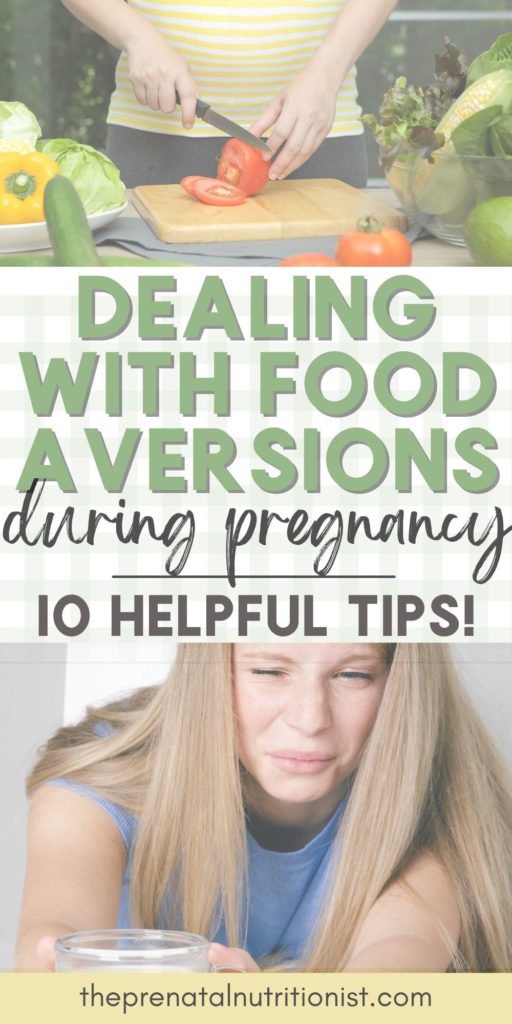
If you’re dealing with food aversions, we see you!
Food aversions are super common during pregnancy. But, unfortunately, that doesn’t make them any easier to deal with. If you’re dealing with food aversions, remember that you’re not alone! We see you and we hope that this roundup of tips will help you better cope with any future food aversions.
For more tips and strategies to manage common pregnancy symptoms like food aversions, nausea, heartburn, and fatigue, check out The Prenatal Nutrition Library! You can actually download, The Prenatal Nutrition Library app for free to take a sneak peek at what’s inside. As always, we wish you a happy and healthy pregnancy and encourage you to check back in for all of our latest releases and updates!
